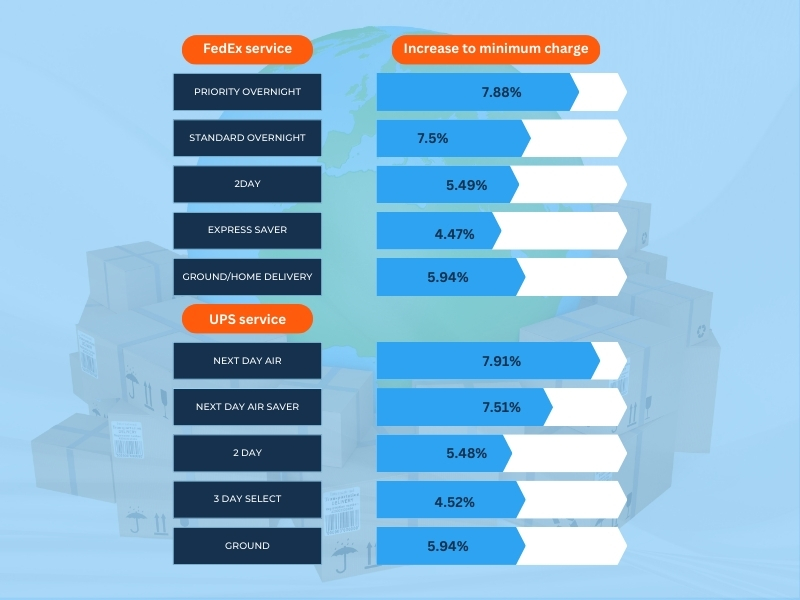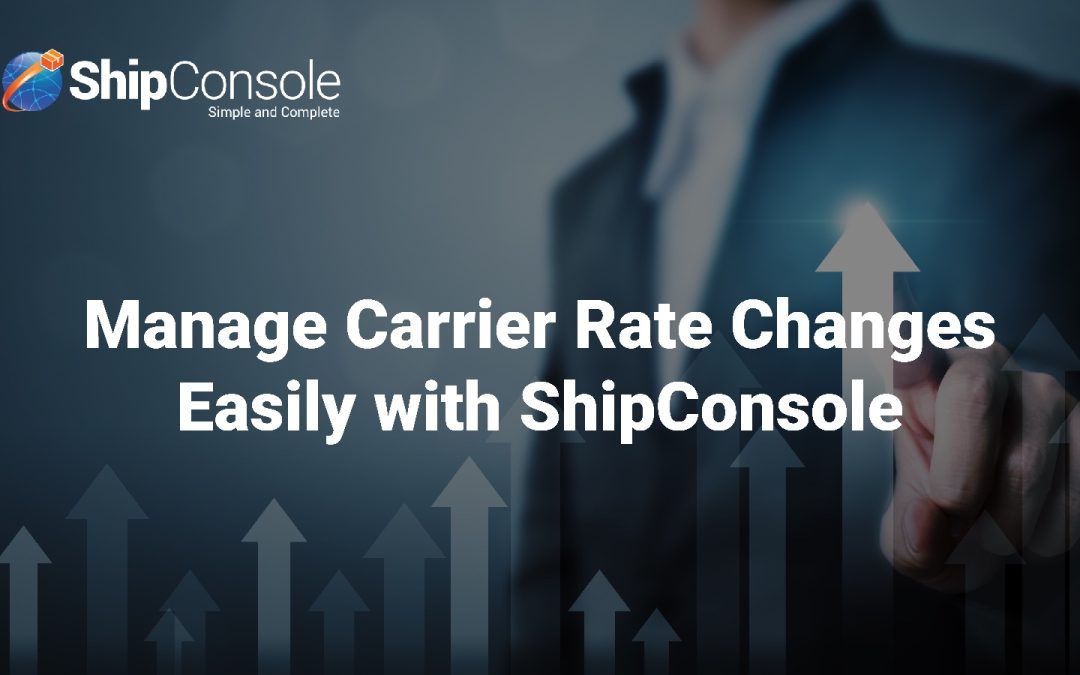In the ever-evolving world of logistics and shipping, staying ahead of changes is crucial for businesses to thrive. Already in 2024 and one month over, major carriers such as UPS and FedEx have implemented rate increases, a decision they announced last year. It’s noteworthy that carriers routinely raise rates annually. Let’s delve into the details of these adjustments and understand how they might impact businesses relying on these shipping giants. Additionally, we’ll explore how solutions like ShipConsole can efficiently navigate these changes.
Understanding the Rate Hike of UPS & FedEx:
Both UPS and FedEx have announced rate increases in 2024, citing various factors such as rising operational costs, fuel prices, and investments in technology and infrastructure. UPS, a global leader in parcel delivery services, has implemented a rate increase averaging around 5.9%. Similarly, FedEx, another key player in the shipping industry, has introduced rate hikes for its services. The average increase for FedEx Ground and FedEx Express services is also around 5.9%. This adjustment covers various service levels, including ground, air, and international shipping. Businesses utilizing UPS or FedEx services will need to factor in these changes to avoid unforeseen budget constraints.

Source: Shipware analysis. Note: UPS’ increases took effect on Dec. 26, 2023. FedEx’s increases took effect on Jan. 1, 2024.
Impact on Delivery Distance, Package Weight, and Service Types.
Rates are influenced by several factors, including delivery distance, package weight, and the type of service used. Let’s delve into how these shipping characteristics contribute to the rate hikes, affecting businesses and their bottom lines.
Delivery Distance: Longer distances typically incur higher transportation costs, which are passed on to the shipper. Depending on the Zonal delivery system, the average price gets increased up to 6.3%.
Package Weight: Weight is a critical factor influencing shipping costs. Heavier packages require more resources for transportation and may experience additional fees. Packages weighing more than 11 pounds may get a price hike of around 6%.
Type of Service Used: The type of shipping service selected by businesses also contributes to the overall cost. Shippers opting into a faster delivery model would generally see a price increase above 5.9%.
Overcoming Shipping Challenges with ShipConsole, an Integrated Solution for Oracle ERPs.
ERP-integrated shipping software like ShipConsole plays a crucial role in overcoming the challenges posed by rate increases in the shipping industry. One significant advantage lies in the direct connectivity to carrier systems through APIs. This eliminates the need for customers to manually upload rate tables into their shipping systems annually when carriers increase rates. This process can be tedious, time-consuming, and requires substantial effort. With ShipConsole, this burden is alleviated, offering a seamless and automated solution for staying up-to-date with carrier rates.
In addition, ShipConsole offers rate quoting and rate shopping, so customers can get estimated rates before they ship and compare rates across carriers to select the best rate option.
The benefits and value of Oracle Integrated Shipping Software such as ShipConsole, extend beyond addressing rate increase challenges. Some key features include:
Out-of-Box Integration with Oracle: ShipConsole seamlessly integrates with various Oracle ERPs, including E-Business Suite, ERP Cloud, JD Edwards, and NetSuite, ensuring a smooth and efficient connection with existing business systems.
One Platform for Parcels/LTLs: ShipConsole provides a unified platform for managing both parcel and less-than-truckload (LTL) shipments, streamlining the shipping process and enhancing overall efficiency.
Rate Quotes from Sales Orders for Parcels/LTLs: The software facilitates the generation of rate quotes directly from sales orders, enabling accurate and real-time pricing information for both parcel and LTL shipments.
International Shipping with Customs Documentation: ShipConsole supports international shipping, including comprehensive customs documentation, ensuring compliance and efficiency in cross-border transactions.
Hazmat/DG Support: The software includes support for handling hazardous materials (Hazmat) and dangerous goods (DG), enhancing safety and regulatory compliance in shipping operations.
Shipping Document Repository: ShipConsole provides a centralized repository for storing shipping documents, enhancing organization, and the accessibility of critical shipment information.Rapid Implementation: With ShipConsole, businesses can experience swift and efficient implementation, minimizing disruptions to daily operations.
In conclusion, the importance of incorporating a shipping software such as ShipConsole, cannot be overstated. It not only addresses challenges posed by carrier rate increases but also brings operational efficiency, accuracy, and compliance to shipping processes. As a solution that seamlessly integrates with various Oracle ERPs, ShipConsole emerges as a valuable asset for businesses navigating the complexities of modern shipping requirements. By providing a unified and automated approach, ShipConsole empowers organizations to stay ahead in the dynamic world of logistics.

Pavan Telluru works as a Product Manager at ShipConsole. He brings over a decade of experience to his current role where he’s dedicated to conducting product demos to prospects and partners about how to organizations can efficiently manage their shipping execution process. He also leads marketing efforts at ShipConsole.


